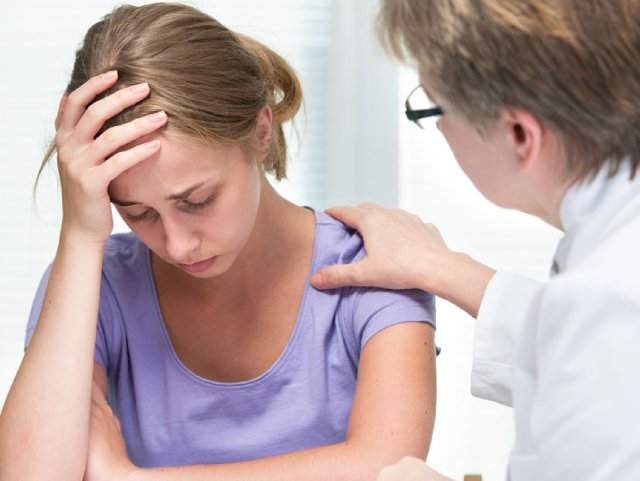I have often talked about how powerful hormones can be. And hormonal diseases are frighteningly common. Polycystic Ovarian Syndrome affects up to 1 in 5 women in Asia and the Middle-East. It is a hormonal disorder with far-reaching consequences like infertility and uterine cancer. Unfortunately most women remain unaware of their disorder.
Although there is no cure, public awareness can lead to early detection and successful management, often with simple lifestyle modifications.
Polycystic Ovarian Syndrome (PCOS) was first recognized in the 1930s. In medical parlance, a “syndrome” refers to a group of symptoms and medical signs which occur together to characterize a particular illness. Most women with PCOS have multiple fluid filled cysts in the ovaries. While there may be several explanations for an ovarian cyst, it is the peculiar constellation of symptoms which occur together to establish the diagnosis.
The main symptom of PCOS is irregular and infrequent menstrual cycles (8 or fewer cycles in a year), starting from puberty or later in life. Other symptoms include weight gain, excess hair on the face and body, oily skin and pimples, thinning of hair on the top of the scalp, thickening and darkening of the skin over the body folds (neck, underarms, inner elbow and groin), decrease in breast size, enlargement of the clitoris and/or deepening of the voice. These symptoms can occur all at once, or one at a time; and most patients have only some of these symptoms.
An ultrasound scan of the pelvis may reveal multiple fluid filled sacs in the ovaries. Blood tests may altered hormonal levels in the blood. Blood insulin level often tends to be high, leaving the sufferer susceptible to diabetes. When left untreated, it can lead to infertility, abnormal bleeding from the uterus, and cancer of the uterine lining (“endometrial carcinoma”). There can also be long term complications of obesity and high insulin levels; like diabetes, heart disease, high cholesterol and sleep disturbances. In fact, PCOS is one of the most common cause for infertility in women.
So what causes PCOS? No one knows for sure. It seems to run in families. Women who reached puberty at a younger age (8-10) maybe at a higher risk of developing PCOS later in life. In many cases, weight gain and insulin resistance are said to be the trigger for hormonal upheavals. Insulin resistance is a condition where the body produces insulin but does not utilize it effectively, which in turn pushes the pancreas to produce even higher levels of insulin. In healthy women, the pituitary gland in the brain produces a hormone called follicle stimulating hormone (FSH) in the first half of the menstrual cycle, which stimulates hundreds of eggs in the ovaries to mature and grow within their tiny follicles. The growing follicles release Estrogen, the female hormone. Mid-cycle, estrogen levels in the blood start to peak, which signals the pituitary gland to produce a surge of hormone called luteinizing hormone (LH). Under the influence of LH, a single follicle becomes dominant, while the remaining follicles dissolve, and the dominant follicle then bursts to release one healthy egg. This process is known as ovulation. In women suffering from PCOS, LH levels are abnormally high at all times, and the mid-cycle hormonal surge fails to take off. Therefore none of multiple fluid filled sacs (seen as ovarian cysts on a scan) mature to release an egg, which explains the infertility.
After ovulation has occurred, the hormone LH directs the ovaries to produce another hormone called progesterone, which prepares the womb (the uterus) for an impending pregnancy. If conception does not occur, the womb sheds its lining along with the unused egg, roughly every 28 days, which we all know as menstruation. This fails to occur in PCOS, and a sufferer may not get her period for 45-90 days or much longer, until the uterine lining becomes so heavy that it breaks down under its own weight, leading to heavy and abnormal bleeding.
High levels of blood insulin and LH leads to increased production of male hormones (testosterone) from the ovaries and adrenal glands. High levels of testosterone also prevent ovulation and cause infertility. The male hormones are also responsible for the typical symptoms like acne, facial hair, weight gain and scalp hair thinning.
Most women remain undiagnosed as they may be unconcerned about their symptoms. However, PCOS which remains undetected and untreated for a prolonged period of time can lead to long-term medical complications. Your GP may refer you to a gynecologist or endocrinologist. The specialist doctor will take a detailed history about your menstrual cycle, check your weight and blood pressure, do a physical examination to detect signs of excess male hormones in your system, and finally order some blood tests and a simple non-invasive ultrasound scan of the abdomen and pelvic area. Patients who are having difficulty conceiving must be evaluated thoroughly, along with their partners. Only a subset of women suffer from infertility. Therefore one must always practice safe sex to avoid sexually transmitted infections and unwanted pregnancies.
Unfortunately there is no permanent cure for PCOS. In many young women, these hormonal upheavals tend to normalize on their own after marriage and child birth. Most women have only milder symptoms like irregular periods and weight gain. In that case, your endocrinologist may choose not to treat you at all. Exercise and weight loss alone can alleviate all symptoms of PCOS, regularize your cycles, and help you get pregnant! Long term weight control is also essential to avoid complications like diabetes and high blood pressure. A balanced diet, which is low on starch, free from saturated fats, refined sugars or processed food, can also go a long way in keeping your symptoms under control. In fact, lifestyle modification is the first line of treatment for PCOS. Many patients have reported benefit from yoga, quitting tobacco and switching to a vegetarian diet.
If your periods continue to remain irregular, your specialist may prescribe hormonal contraceptive pills. If you are plagued with acne and excessive facial hair, then anti-androgen medications are the drug of choice. It also helps women who suffer from hair thinning or balding. Diabetes medication like Metformin can help you lose weight faster, reduce blood insulin levels, and regulate menstrual cycles. For women who are trying to conceive, fertility medications are prescribed. Uncommonly,when fertility medications fail to work, your gynecologist may suggest a laparoscopic ovarian drilling procedure. Using a key-hole incision, your surgeon may insert a small needle to drill multiple holes in your ovaries using electric current. This is done to destroy small areas of ovarian tissue where testosterone is produced. This process can help induce ovulation, so that you may conceive.
With treatment, most women go on to conceive and have healthy babies. During pregnancy, women must be screened for diabetes of pregnancy before 20 weeks of gestation. If you do develop gestational diabetes, it is likely to recur in future pregnancies, and you are at high risk for diabetes later in life. In fact, all PCOS patients are advised to get their blood sugars tested on an annual basis.
Symptoms like acne, excess hair growth, skin tags and skin pigmentation can be effectively treated by a dermatologist. However, it is advisable to get onto hormonal medications for best results. Thoroughly discuss the pros and cons of hormonal medication with your doctor and your family, while keeping an open mind. Visit a physician at regular intervals for early detection and management of any untoward sequelae. Some of the symptoms of PCOS can cause severe depression, mood swings and loss of self-esteem. The hormonal fluctuations do not help. If a loved one is suffering from PCOS, shower them with compassion and understanding. Do not hesitate to approach a counselor or mental health professional if you feel the need.




